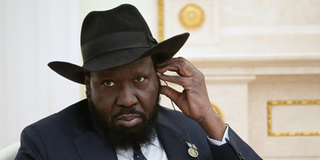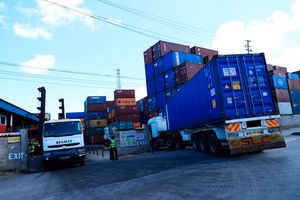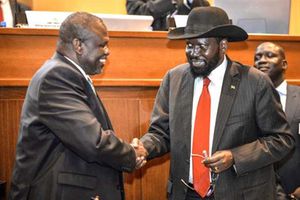
South Sudan's President Salva Kiir.
South Sudan is looking to extend its transitional government for the third time, the result of unmet targets in preparing for elections and a realistic assessment that polls now will be riskier than later.
Senior government officials gathered in Juba this week to pore over the problem, even as the UN Security Council was told of the sore delays in implementing bits of the peace agreement that would have made it easier to conduct elections.
Now, it is almost a foregone conclusion that the Transitional Government of National Unity (TGNU), whose expiry date is September 22, will be extended, and the planned December 22 polls are no longer tenable.
At a meeting of the presidency involving President Salva Kiir and his five vice-presidents, including former nemesis Riek Machar, the parties to the 2018 peace agreement expressed doubt about the proposed election date.
The presidency on August 13 directed the National Election Commission, the National Constitution Review Commission and the Political Parties Council to provide a realistic timetable for the parties to agree on the General Election date.
That meeting in Juba came as the Reconstituted Joint Monitoring and Evaluation Commission (RJMEC) also weighed inat a briefing to the United Nations Security Council in New York.
RJMEC, which monitors the implementation of the peace deal, said that a realistic timetable for elections must be accompanied by a budget and guaranteed funding. Both are missing.
“Despite the extension of the transitional period by 24 months, key tasks such as completion of the unification of forces, making of the permanent constitution, and various elections-related preparatory tasks are still outstanding,” Maj-Gen Charles Gituai, RJMEC chairperson, told the UN Security Council on Tuesday.
The transitional government is facing a situation where it will have no mandate to govern the country unless the elections are held, or the parties agree to an extension to prepare for elections and enact a permanent constitution. That stalemate is likely to force them into a compromise of extending the government possibly for another two years, sources indicated.
In August 2022, the parties agreed to a 24-month extension because some key articles of the 2018 peace agreement —officially known as the Revitalised Agreement on the Resolution of the Conflict in South Sudan (R-ARCSS) — such as security sector reforms had not been implemented.
The R-ARCSS, agreed in September 2018, was itself delayed for over a year because parties were unable to return to Juba to form the government, and continued to haggle over positions.
At the Juba meeting on Tuesday, the Presidency received a detailed report from the High-Level Committee on the Implementation of the Peace Agreement and the Status of the Implementation of the Roadmap.
Martin Elia Lomuro, Minister for Cabinet Affairs, said the committee submitted two proposals: Either the elections be conducted as scheduled, or consider the suggestion by Dr Riek Machar’s SPLM-IO that elections be deferred by 24 months because of the critical provisions that are outstanding.
The National Elections Commission (NEC) is mandated by the National Elections Law to prepare a voter register six months ahead of polling day and conduct civic and voter education. Yet voter registration, which was supposed to start in June, is yet to kick off.
NEC chairperson Abednego Akol had declared December 22 as election day, but added a rider that “even if the elections are delayed, they had to announce a date.”
It appears that the Nairobi mediation initiative between the transitional government and the hold-out groups that were launched in May could provide a basis for an extension once all the parties sign the eight protocols.
Mr Lomuro said that the Nairobi Dialogue — christened the Tumaini Initiative — must be aligned with the 2018 peace agreement framework and that any provisions that contradict the existing peace agreement would be removed.
The Tumaini Initiative and its outcomes so far have been criticised by First Vice-President Dr Machar because some of the articles in the protocols signed by the parties, stakeholders and mediators are inconsistent with the corresponding provisions in the R-ARCSS.
Dr Cirino Hiteny, a member of the Real-SPLM, said that any articles and provisions in the Tumaini protocols that do not align with the Agreement are not a matter of concern.
“The inconsistency is deliberate to avoid the pitfalls of the implementation of the agreement, including resource mismanagement,” he said.
The eight Tumaini protocols that have been signed by the parties are: Confidence-building Measures; Communal violence and Land Issues; Justice Sector Reforms, Transitional Justice and Accountability; Security Sector Reforms; Permanent Constitution Process; Economic Recovery; Humanitarian Access and Support; and Responsibility Sharing.
One of the challenging protocols is that the country must have a permanent constitution before holding elections. The chairperson of the National Constitutional Review Commission (NCRC), Dr Riang Yer Zuor, reported that not much has been done on the constitutional making due to a lack of funds.
The NCRC had requested $43 million to cater for the national constitution conference, the constituent assembly and other activities, but has so far received only $800,000.


